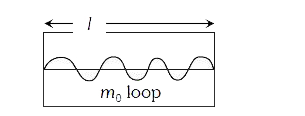A photon of wavelength λ is absorbed by an electron confined to a box of length √35hλ/8mc . As a result, the electron makes a transition from state k = 1 to the state n Subsequently the electron transits from the state n to the state m by emitting a photon of wavelength λ=1.75λ then
A
n=4:m=2
B
n=5:m=3
C
n=6:m=4
D
n=3:m=1
Video Solution
Text Solution
The correct Answer is:C
KE of e−=hcλ

λde - Broglie=h√2mKE=h√2m×hcλ=√hλ√2mc
m0λde-Broglie2=l
⇒m02×√hλ2mc=√35hλ√8mc⇒m0=√35=5.8≈6
i.e. e− get excite to state 6, ∴n=6
|
Similar Questions
Knowledge Check
A photon of wavelength λ is absorbed by an electron confined to a box of length √35hλ/8mc. . As a result, the electron makes a transition from state k = 1 to the state n. Subsequently the electron transits from the state n to the state m by emitting a photon of wavelength λ'=1.85λ. Then
An = 4, m = 2Bn = 5, m =3Cn = 6, m = 4Dn = 3, m = 1When an electron makes a transition from (n+1) state of nth state, the frequency of emitted radistions is related to n according to (n>>1):
Av=2CZ2RHn3Bv=CZ2RHn4Cv=CZ2RHn2Dv=2CZ2RHn2When an electron makes a transition from (n+1) state to n state the frequency of emitted radiation is related to n according to (n>>1)
Av∝n−3Bv∝n2Cv∝n3Dv∝n23
An electron in C5+ ion during the transition from n=3 to n=1 emits light of wavelength
View SolutionThe electron in a hydrogen atom at rest makes a transition from n=2 energy state to the n=1 ground state.
find the energy (eV) of the emitted photon.
View Solutionn' photons of wavelength 'λ' are absorbed by a black body of mass 'm'. The momentum gained by the body is
View SolutionWhat is the wavelength of a photon emitted during a transition from n=5 state to the n=2 state in the hydrogen atom
View SolutionAn electron makes transition form n=3, n=1 state in a hydrogen atom. The maximum possible number of photons emitted will be
View Solution
